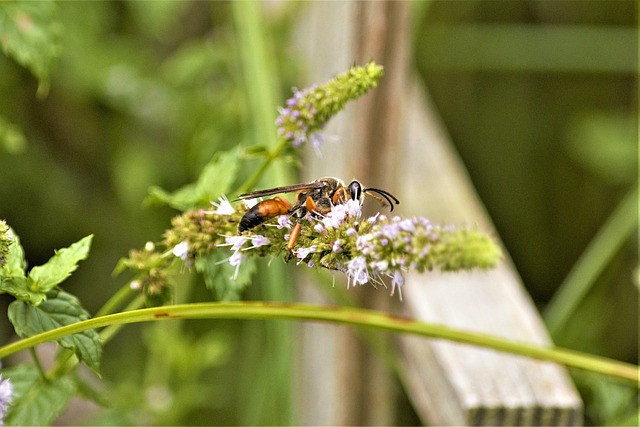Wasps, despite their small size, play significant roles in ecosystems and impact human activities. They contribute to pollination and pest control but can also be a nuisance and health hazard. Traditional toxic pesticides harm non-target organisms and promote wasp resistance. Eco-friendly wasp solutions, like pheromone traps and drone-based treatments using essential oils, are gaining popularity as sustainable alternatives. Advanced technologies, including AI and IoT, enable precise, efficient, and environmentally conscious wasp management, driving the development of new eco-friendly methods.
In the face of growing pest control challenges, understanding and mitigating the impact of wasps have become paramount. Wasps, with their complex behavior and ecological role, can also pose significant risks to humans and crops. This article explores advanced technologies transforming wasp management. From traditional methods plagued by drawbacks to eco-friendly solutions, we delve into innovative detection and treatment techniques. Discover how these cutting-edge eco-friendly wasp solutions are redefining pest control while preserving the balance of nature.
Understanding Wasps: Behavior and Impact
Wasps, despite their small size, can have a significant impact on ecosystems and human activities. Understanding their behavior is crucial when developing effective eco-friendly wasp solutions. These insects are highly social and live in colonies with a distinct hierarchy. They primarily feed on nectar and insects, playing a vital role in pollination and pest control. However, their stinging capability makes them a nuisance and potential health hazard, especially for individuals allergic to bee and wasp stings.
The impact of wasps extends beyond individual encounters. Their presence can disrupt outdoor activities, affect local agriculture, and even pose risks to structural integrity, as some species nest in cavities. This highlights the need for advanced technologies that address wasp-related issues while minimizing environmental harm. Eco-friendly methods aim to control wasp populations through non-toxic means, such as using pheromones or natural predators, ensuring a balance between human comfort and ecological preservation.
Traditional Wasp Control Methods and Their Drawbacks
Traditional methods of wasp control often rely on toxic pesticides, which can have significant drawbacks. These chemical substances may pose risks to non-target organisms, including beneficial insects and wildlife, and can contaminate local water sources and soil. Additionally, wasps are highly adaptable, leading to the development of resistance against common insecticides over time. This not only reduces the effectiveness of these methods but also encourages the use of even more potent chemicals.
As a result, there is an increasing demand for eco-friendly wasp solutions that are both safe and sustainable. These alternative approaches focus on non-toxic methods, such as using natural predators or parasitic wasps to control populations, implementing physical barriers, and employing heat or cold treatments. Such techniques not only minimize environmental impact but also promote a more harmonious coexistence between humans and these important pollinators and predators in the ecosystem.
Eco-Friendly Technologies for Detection and Treatment
In the pursuit of sustainable pest control, eco-friendly technologies offer promising solutions for detecting and treating wasps. These innovative methods prioritize minimizing environmental impact while effectively managing wasp populations. One such approach involves the use of pheromone traps, which attract wasps using synthetic replicas of their natural chemicals. This non-toxic method not only traps wasps but also allows for targeted collection and study without harming beneficial insects or the ecosystem.
Another promising eco-friendly technology is the integration of drones and advanced sensors. Drones equipped with cameras and heat sensors can accurately identify wasp nests, enabling precise treatment locations. Using natural repellents like essential oils or plant extracts as treatments further reduces ecological disruptions. These methods not only provide effective wasp control but also align with the growing demand for sustainable and environmentally conscious pest management practices.
Implementation and Future Prospects of Advanced Solutions
The implementation of advanced technologies in wasp detection and treatment presents an exciting avenue for pest control, particularly in pursuit of eco-friendly wasp solutions. These innovative methods include the utilization of artificial intelligence (AI) and machine learning algorithms that can analyze patterns and predict wasp activities, enabling precise and targeted interventions. For instance, AI-powered drones equipped with high-resolution cameras and sensors can swiftly scan large areas, identify wasp nests, and even differentiate between different wasp species. This level of precision ensures the effective use of resources without harming beneficial insects or causing unnecessary environmental impact.
Looking ahead, the future prospects for these advanced solutions are promising. Integrating IoT (Internet of Things) devices allows for real-time monitoring of wasp populations and behavior, providing valuable data for researchers and pest control professionals. This data-driven approach can lead to more customized and efficient treatment strategies. Additionally, advancements in robotics and automation may introduce innovative wasp removal methods that minimize human interaction, enhancing safety and reducing the risk of stings while promoting safer eco-friendly wasp solutions.
Advanced technologies offer a promising future for managing wasps in an eco-friendly manner. By leveraging innovations in detection and treatment, we can significantly reduce the environmental impact of traditional methods while effectively controlling wasp populations. As these solutions gain adoption, we move closer to a more sustainable balance between human activities and nature, ensuring both safety and ecological preservation. Eco-friendly wasp solutions are not just a trend but a necessary step towards a greener future.
